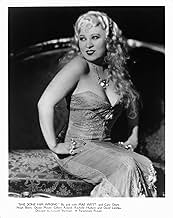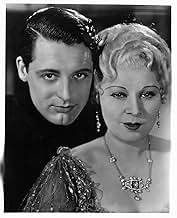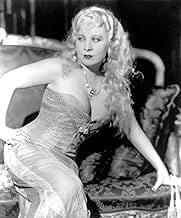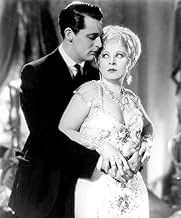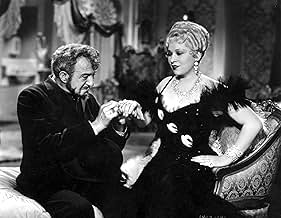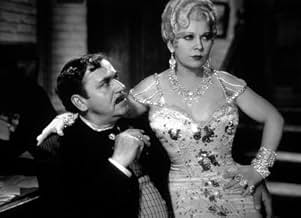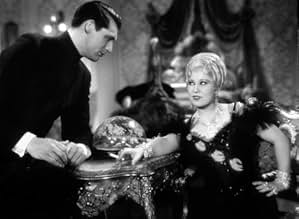PUNTUACIÓN EN IMDb
6,3/10
7,4 mil
TU PUNTUACIÓN
Lady Lou es una mujer de Nueva York a finales del siglo XIX que se ha hecho a sí misma. Un día conoce a un apuesto joven pero, aunque enamorada, no está dispuesta a dejarse intimidar y decid... Leer todoLady Lou es una mujer de Nueva York a finales del siglo XIX que se ha hecho a sí misma. Un día conoce a un apuesto joven pero, aunque enamorada, no está dispuesta a dejarse intimidar y decide llevar la voz cantante.Lady Lou es una mujer de Nueva York a finales del siglo XIX que se ha hecho a sí misma. Un día conoce a un apuesto joven pero, aunque enamorada, no está dispuesta a dejarse intimidar y decide llevar la voz cantante.
- Dirección
- Guión
- Reparto principal
- Nominado para 1 premio Óscar
- 5 premios y 1 nominación en total
Noah Beery
- Gus Jordan
- (as Noah Beery Sr.)
Robert Homans
- Doheney
- (as Robert E. Homans)
Ernie Adams
- Man in Audience
- (sin acreditar)
Billy Bletcher
- Singing Waiter
- (sin acreditar)
Wade Boteler
- Dan's Pal
- (sin acreditar)
Jack Carr
- Patron Who Hits His Girl
- (sin acreditar)
Reseñas destacadas
After a supporting role in the George Raft film Night After Night, Paramount films realized what a gold mine they had in Mae West. Between her and a young radio singer named Bing Crosby, they pulled Paramount from the brink of bankruptcy, the white mountain studio nearly went under in the early Thirties.
After this the studio gave Mae her head in choosing material and she decided to use one of her own original plays, She Done Him Wrong. The story is set in the Bowery district of the 1890s and New York of the 1890s is where Mae grew up, she had a good ear and a good memory for character types she uses in the film.
Mae always plays Mae West and would you really want her as anyone else? She's a Bowery entertainer of the period, working in this case for Noah Beery's club as the main attraction. Beery's into some really shady business, he doubles in white slavery and nearly gets innocent Rochelle Hudson who tries to kill herself in his club. Mae saves her, but turns her over to Beery because she doesn't know about his other sideline. All she knows is that he pays off in diamonds as well as cash.
Besides Beery panting after her, we've got silent screen star Owen Moore, young Gilbert Roland who is the assistant to white slaver Rafaela Ottiana and in the film that would be his breakthrough, Cary Grant as a Salvation Army worker who's not all he seems. Mae personally picked Grant for his role, he was a young Paramount contract player beginning to get some notice. But as I said before in my review of I'm No Angel, this is not a Cary Grant film, this is a Mae West film.
Mae besides being one of the great sex symbols of the last century had a great memory and eye for detail of the bawdy Bowery of her youth. Good thing she came along before The Code was put in place. Her first films are her best, The Code definitely hampered her style.
And Mae West if she had anything, had style.
After this the studio gave Mae her head in choosing material and she decided to use one of her own original plays, She Done Him Wrong. The story is set in the Bowery district of the 1890s and New York of the 1890s is where Mae grew up, she had a good ear and a good memory for character types she uses in the film.
Mae always plays Mae West and would you really want her as anyone else? She's a Bowery entertainer of the period, working in this case for Noah Beery's club as the main attraction. Beery's into some really shady business, he doubles in white slavery and nearly gets innocent Rochelle Hudson who tries to kill herself in his club. Mae saves her, but turns her over to Beery because she doesn't know about his other sideline. All she knows is that he pays off in diamonds as well as cash.
Besides Beery panting after her, we've got silent screen star Owen Moore, young Gilbert Roland who is the assistant to white slaver Rafaela Ottiana and in the film that would be his breakthrough, Cary Grant as a Salvation Army worker who's not all he seems. Mae personally picked Grant for his role, he was a young Paramount contract player beginning to get some notice. But as I said before in my review of I'm No Angel, this is not a Cary Grant film, this is a Mae West film.
Mae besides being one of the great sex symbols of the last century had a great memory and eye for detail of the bawdy Bowery of her youth. Good thing she came along before The Code was put in place. Her first films are her best, The Code definitely hampered her style.
And Mae West if she had anything, had style.
Mae West was a veteran of burlesque, vaudeville and the Broadway stage by the time she made her first film in 1932 at the age of 39. `She Done Him Wrong' was her second film and her first starring role in an adaptation of her smash Broadway hit `Diamond Lil'. It was a play that West had written herself and it played to packed houses on Broadway for years. This film was nominated for an Academy Award for best picture and made Cary Grant into an instant star. Mae went on to write nine of the fourteen screenplays for films in which she was to star. Thus, all those great quotes we've heard that are attributed to her were not only said by her, but written by her as well. By 1935, she was the most highly paid woman in America. To this day, she remains one of the female stars most often imitated by female impersonators.
This film is among her best. It is full of the bawdy double entendre that became her trademark. She was the queen of sexual innuendo and suggestive dialogue and many of her lines have become part of Americana (e.g. `Is that a gun in your pocket or are you just glad to see me?' And, `A hard man is good to find.' And of course, `Come up and see me sometime.')
The plot of this film is simplistic and it is clearly a vehicle for her enormous talent, leading up to the now famous proposal by Cary Grant at the end of the film. Mae commands every frame of the film with her incomparable combination of sex appeal and ribald humor. Her sense of comic timing is impeccable making the funny lines she writes that much more hilarious by the snide way in which she delivers them.
Before this film, Cary Grant had appeared in half a dozen films and was building a reputation as a solid actor. However, none of his early films gave him the exposure that this film did due to its wild popularity at the time. West handpicked him for the part saying that he combined virility with the bearing of a gentleman. She wanted someone who would epitomize the now famous line, `Hello, warm, dark and handsome.' Though his role in this film is minor compared to West's, it made him a household name and a bankable star.
This classic film is a piece of film history that shouldn't be missed. I rated it a 10/10. It is among Mae West's best moments. I highly recommend it.
This film is among her best. It is full of the bawdy double entendre that became her trademark. She was the queen of sexual innuendo and suggestive dialogue and many of her lines have become part of Americana (e.g. `Is that a gun in your pocket or are you just glad to see me?' And, `A hard man is good to find.' And of course, `Come up and see me sometime.')
The plot of this film is simplistic and it is clearly a vehicle for her enormous talent, leading up to the now famous proposal by Cary Grant at the end of the film. Mae commands every frame of the film with her incomparable combination of sex appeal and ribald humor. Her sense of comic timing is impeccable making the funny lines she writes that much more hilarious by the snide way in which she delivers them.
Before this film, Cary Grant had appeared in half a dozen films and was building a reputation as a solid actor. However, none of his early films gave him the exposure that this film did due to its wild popularity at the time. West handpicked him for the part saying that he combined virility with the bearing of a gentleman. She wanted someone who would epitomize the now famous line, `Hello, warm, dark and handsome.' Though his role in this film is minor compared to West's, it made him a household name and a bankable star.
This classic film is a piece of film history that shouldn't be missed. I rated it a 10/10. It is among Mae West's best moments. I highly recommend it.
It appears that some modern day critics have forgotten what a great period film is all about. This very authentic replica of the Gay Nineties (1890s) is accurate right down to the horse hair furniture, gas lamps, Brooklyn accents and costumes. It was adapted from Mae West's Broadway hit "Diamond Lil" and coupled with West's other 1933 hit (I'm No Angel), saved Paramount from bankruptcy. The film was so loved by audiences that midnight showings were needed to accommodate the crowds, and it was so lurid that seven countries banned the film altogether. It was nominated for the best picture of 1933 and was West's favorite of all her twelve films. The film introduced the famed line (although it's uttered slightly different in the movie) "Come up and see me sometime." Some of Mae's funniest work is here, and she sings three great tunes. Edith Head did all the costumes and Lowell Sherman directed. Modern times have dulled the bluntness of this film, but be assured, it was an eye-popper in 1933.
Set mostly in a bawdy saloon/dance hall in NYC during the 1890s, this film is a showcase for the talents of Mae West. She plays Lady Lou, a self-confident, sassy singer with a quick wit, who entertains customers with songs that have a Blues theme and were popular in vaudeville.
In this role, buxom Mae West is at her best. She struts her stuff, she wears tons of diamonds, she smiles in a slightly mischievous way, she rolls her eyes, and she speaks in a voice that is more than a little nasal. Her costumes are glamorous and flamboyant. In short, she presents an on-screen image that is wonderfully ... unique.
The film's story is thin and largely irrelevant. It involves the people around Lady Lou, some of whom are schemers and cheats. Implicit sexual references in the dialogue, and the character of Lady Lou, led the "National Legion of Decency" to push down our throats the Production Code, a wretched policy device that censored cinematic content for some thirty years thereafter.
If I have a complaint with this film it is that the story is too serious. Mae West is placed in scenes that allow her merely to recite dialogue. She is less an actress than a singer and on-stage performer. I would have preferred a more lighthearted musical theme, to play up her musical talents.
And so for me, the best parts of this film are the musical numbers few though they may be. Mae West sings "Frankie And Johnny" and a couple of other songs. One of my favorite sequences occurs about midway through the film. In what appears to be an authentically designed music hall set, an Irish tenor with a big mustache sings "Silver Threads Among The Gold", a musical tearjerker popular with barbershop quartets of that era. The song's sad theme prompts a man in the audience literally to "cry in his beer". Gas lights point upward to the stage. And behind the singing tenor, a curtain sways back and forth, with product signs that read "Old Whiskey", "Dijon Burgundy", among others. It's a sequence that is straight out of vaudeville. Marvelous!
"She Done Him Wrong" is a film whose story almost gets in the way of the main character, played by a legendary talent. The film is worth watching more than once, but only to see marvelous Mae West, and to listen to those wonderful songs from the bygone days of vaudeville.
In this role, buxom Mae West is at her best. She struts her stuff, she wears tons of diamonds, she smiles in a slightly mischievous way, she rolls her eyes, and she speaks in a voice that is more than a little nasal. Her costumes are glamorous and flamboyant. In short, she presents an on-screen image that is wonderfully ... unique.
The film's story is thin and largely irrelevant. It involves the people around Lady Lou, some of whom are schemers and cheats. Implicit sexual references in the dialogue, and the character of Lady Lou, led the "National Legion of Decency" to push down our throats the Production Code, a wretched policy device that censored cinematic content for some thirty years thereafter.
If I have a complaint with this film it is that the story is too serious. Mae West is placed in scenes that allow her merely to recite dialogue. She is less an actress than a singer and on-stage performer. I would have preferred a more lighthearted musical theme, to play up her musical talents.
And so for me, the best parts of this film are the musical numbers few though they may be. Mae West sings "Frankie And Johnny" and a couple of other songs. One of my favorite sequences occurs about midway through the film. In what appears to be an authentically designed music hall set, an Irish tenor with a big mustache sings "Silver Threads Among The Gold", a musical tearjerker popular with barbershop quartets of that era. The song's sad theme prompts a man in the audience literally to "cry in his beer". Gas lights point upward to the stage. And behind the singing tenor, a curtain sways back and forth, with product signs that read "Old Whiskey", "Dijon Burgundy", among others. It's a sequence that is straight out of vaudeville. Marvelous!
"She Done Him Wrong" is a film whose story almost gets in the way of the main character, played by a legendary talent. The film is worth watching more than once, but only to see marvelous Mae West, and to listen to those wonderful songs from the bygone days of vaudeville.
She Done Him Wrong (1933)
*** (out of 4)
Set during the "Gay Ninetiest," Mae West stars as Lady Lou, a nightclub singer who pretty much seduces and vamps over any man that enters the club. Since she has her pick of the litter she sets her sights on the handsome Captain Cummings (Cary Grant).
To say SHE DONE HIM WRONG was 100% Mae West would be an understatement. The actress was a smash on Broadway and her sexual act was quite legendary even during a time when that type of thing wasn't always wanted or allowed. Her stage play was attempted to get on the big screen for a couple years before this film finally did it even though it had to be watered down some. With that said, there's still plenty of sexuality on display here, although you can't help but think this is one of the films that helped eventually bring on the Production Code.
As far as the film goes, it was a smash when it was originally released and it even got a Best Picture Oscar nomination. Watching it today the film is obviously not as strong but at the same time you can't help but watch it and just imagine how people must have felt about it in 1933. The main reason to watch this is of course for the performance of West who is pretty much playing herself. The over-the-top, heated sexuality is actually a lot of fun to watch. You know, I've never found her to be an "attractive" woman but the way she forces her sexuality is just something that works.
The supporting cast is quite good including Grant in another early role where he's pretty much playing that good looking guy that's the object of the main characters affection. Owen Moore, Noah Beery, Sr. and Gilbert Roland are all good as well. The screenplay is another plus or at least the dialogue spoken by West is. She gets a couple classic lines and her delivery is certainly a plus. With that said, the story itself is pretty hit and miss but the 66-minute running time does fly by.
*** (out of 4)
Set during the "Gay Ninetiest," Mae West stars as Lady Lou, a nightclub singer who pretty much seduces and vamps over any man that enters the club. Since she has her pick of the litter she sets her sights on the handsome Captain Cummings (Cary Grant).
To say SHE DONE HIM WRONG was 100% Mae West would be an understatement. The actress was a smash on Broadway and her sexual act was quite legendary even during a time when that type of thing wasn't always wanted or allowed. Her stage play was attempted to get on the big screen for a couple years before this film finally did it even though it had to be watered down some. With that said, there's still plenty of sexuality on display here, although you can't help but think this is one of the films that helped eventually bring on the Production Code.
As far as the film goes, it was a smash when it was originally released and it even got a Best Picture Oscar nomination. Watching it today the film is obviously not as strong but at the same time you can't help but watch it and just imagine how people must have felt about it in 1933. The main reason to watch this is of course for the performance of West who is pretty much playing herself. The over-the-top, heated sexuality is actually a lot of fun to watch. You know, I've never found her to be an "attractive" woman but the way she forces her sexuality is just something that works.
The supporting cast is quite good including Grant in another early role where he's pretty much playing that good looking guy that's the object of the main characters affection. Owen Moore, Noah Beery, Sr. and Gilbert Roland are all good as well. The screenplay is another plus or at least the dialogue spoken by West is. She gets a couple classic lines and her delivery is certainly a plus. With that said, the story itself is pretty hit and miss but the 66-minute running time does fly by.
¿Sabías que...?
- CuriosidadesThe National Legion of Decency was formed in October of 1933, six months after the release of this film. Legion officials cited Mae West and the film as one of the major reasons for the "necessity" of the organization.
- PifiasShadow of camera moves against the back wall of Lady Lou's apartment while she and Sally are talking.
- Versiones alternativasMaryland, Massachusetts, New York, Ohio, and Pennsylvania removed the song "A Guy What Takes His Time". Will H. Hays and Adolph Zukor went to New York to edit the song to an entrance by Mae West, one opening verse, and one closing verse to lessen the suggestiveness. Despite this, Ohio and Pennsylvania cut all of West's one liners.
- ConexionesFeatured in The Twentieth Century: The Movies Learn to Talk (1959)
Selecciones populares
Inicia sesión para calificar y añadir a tu lista para recibir recomendaciones personalizadas
- How long is She Done Him Wrong?Con tecnología de Alexa
Detalles
- Fecha de lanzamiento
- País de origen
- Idioma
- Títulos en diferentes países
- Nació para pecar
- Localizaciones del rodaje
- Empresa productora
- Ver más compañías en los créditos en IMDbPro
Taquilla
- Presupuesto
- 200.000 US$ (estimación)
- Duración1 hora 6 minutos
- Color
- Relación de aspecto
- 1.37 : 1
Contribuir a esta página
Sugerir un cambio o añadir el contenido que falta


